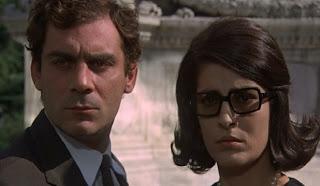 We Still Kill the Old Way (1967) marked the first of four collaborations between Elio Petri and Gian Maria Volonte. More subtly political than later works like Investigation of a Citizen Above Suspicion (1970), it views corruption and crime through a sociologist's lens - a lens as harsh towards its nominal hero as its villains.
We Still Kill the Old Way (1967) marked the first of four collaborations between Elio Petri and Gian Maria Volonte. More subtly political than later works like Investigation of a Citizen Above Suspicion (1970), it views corruption and crime through a sociologist's lens - a lens as harsh towards its nominal hero as its villains.In a village outside Palermo, gunmen murder Arturo Manno (Luigi Pistilli) and Professor Roscio (Salvo Randone) while hunting. The case seems open-and-shut - Manno was a known womanizer who'd received anonymous death threats, and police quickly arrest a lower class suspect. However, Manno's friend Paolo Laurna (Gian Maria Volonte), a local professor, harbors doubts. Along with his attorney friend Rosello (Gabriele Ferzetti) and Roscio's widow (Irene Papas), he seeks to uncover the true killers, unaware of how many obstacles lie in his path.
Based on a Leonardo Sciascia novel, We Still Kill the Old Way is less conventional than a synopsis suggests. Petri and Sciascia (who also co-wrote the script) use this seemingly commonplace murder to probe the disconnect in Sicily between law and justice, modernity and tradition. One early scene has Laurna and a friend witness a car bombing, then casually remark how much Sicily resembles the Wild West. There's little hope of change; vendetta and silence are simply part of everyday life, a cycle of deaths and funerals that leave questions no one dares to answer.
Sciascia's novels (which also inspired The Day of the Owl and Illustrious Corpses) fixate heavily on the connection between crime and political corruption. Police show little interest in the crime, arresting the husband of one of Arturo's paramours and discouraging further investigation. Rosello, a slick liberal who pretends to care about the downtrodden, shows no real concern in solving the case and more interest in improving his own social standing. Characters seem to regard justice more as an abstract proposition rather than something achievable; more important to maintain to the status quo.
Thus Laurna takes over. His interest seems no less detached than Rosello's at first, despite his friendship with Manno; curiosity, or boredom, motivates him more than vengeance. And perhaps other concerns, as his affection for Mrs. Roscio becomes transparent. He uncovers tantalizing clues (an extortion letter using clippings from an obscure Vatican newspaper) without piecing together a larger picture; all that results is frustration and bitterness. He and his allies are threatened, stalked and bullied by assailants who seem almost abstract themselves; their threat is real, but everything remains frustratingly intangible.
Gian Maria Volonte's performance is unusually low key, emphasizing Laurna's self-regard and detachment. He's neither a radical nor a criminal, as with Volonte's more famous roles, but an intellectual badly out of his depth playing detective. Irene Papas fares well in a role that most involves her reacting to Volonte's clues or advances. Gabriele Ferzetti is perfectly cast as a well-connected investigator with no convictions. Spaghetti Western mainstay Luigi Pistilli is murdered before the first reel.
We Still Kill the Old Way leaves its mystery as ambiguous to viewers as its characters. We don't know if the murders were triggered by organized crime, political extremists or someone with a personal grudge; it doesn't really matter. In the climax, Laurna's accosted by thugs and becomes yet another victim. Life goes on, unchanged; what's another murder in Sicily?

